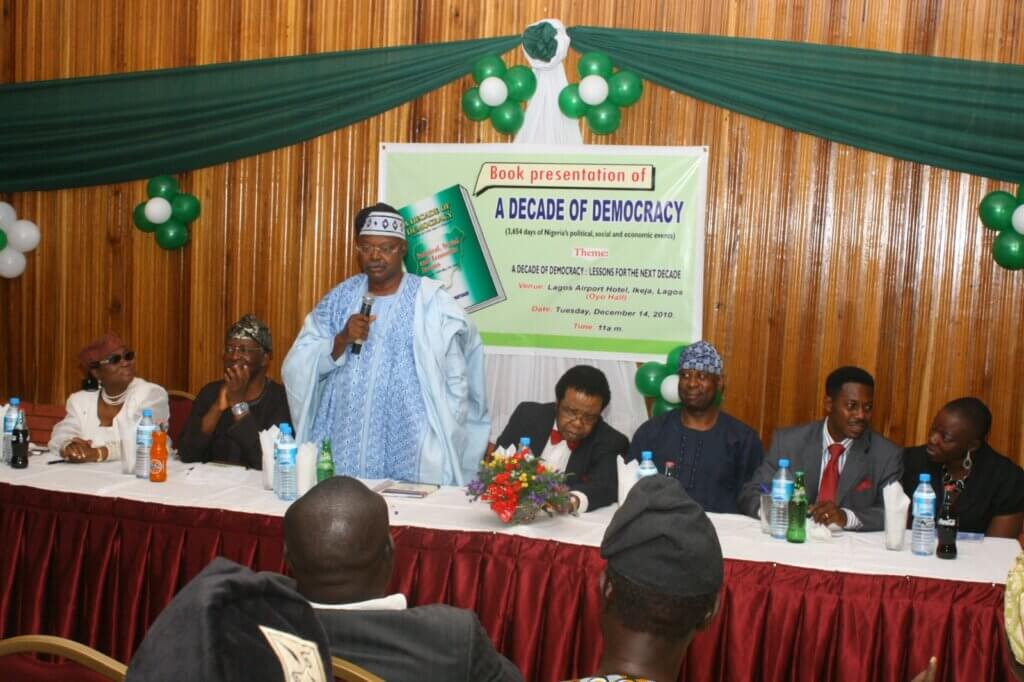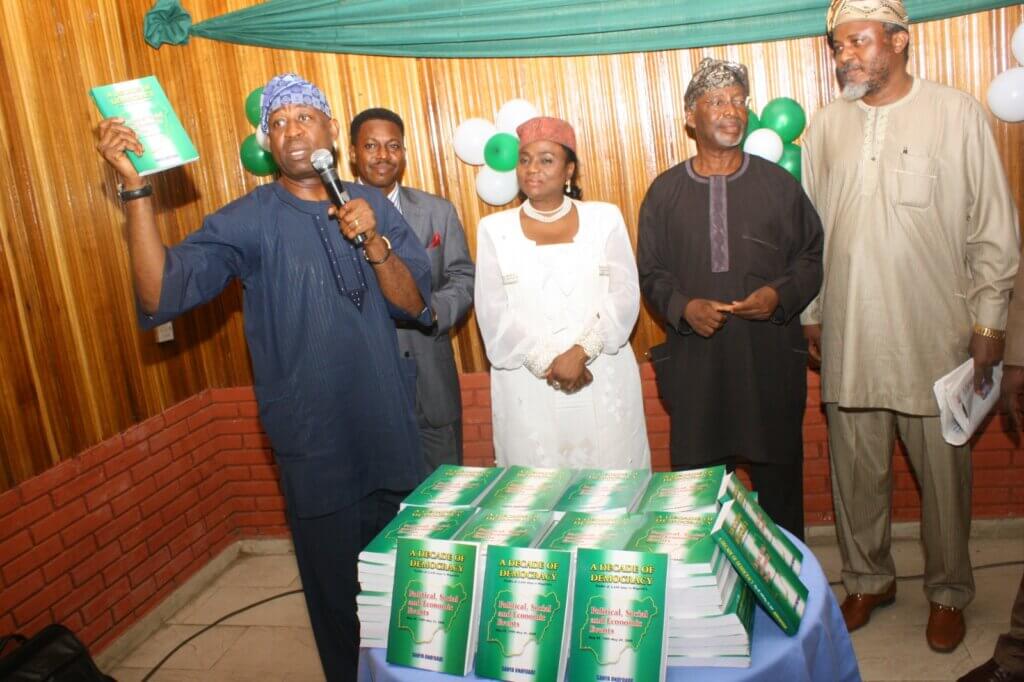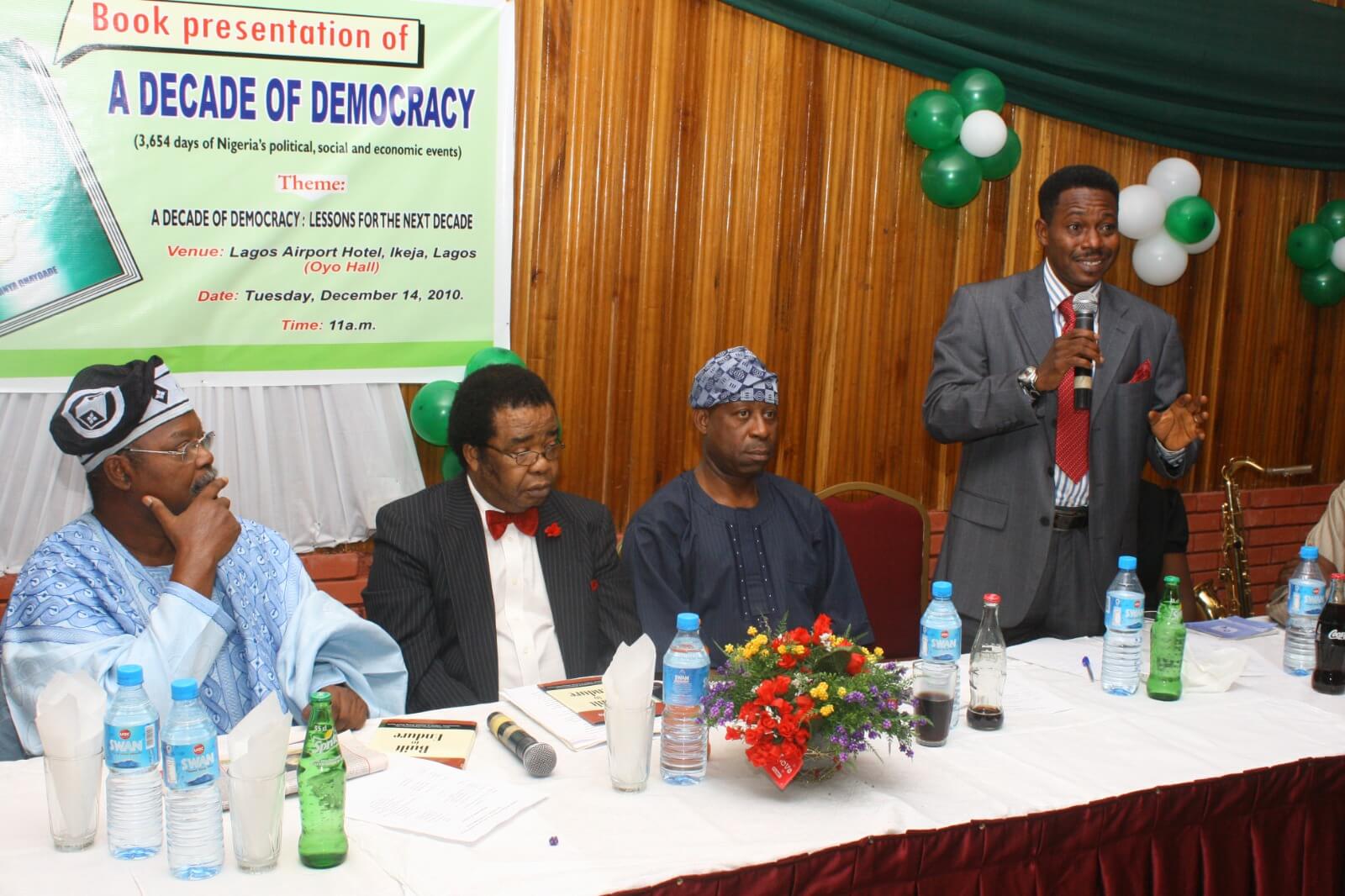2010 – Fifteen years ago, was when my book, A DECADE OF DEMOCRACY, was launched under the distinguished chairmanship of the respected academic, diplomat and former Minister of Foreign Affairs, Prof. Bolaji Akinyemi. Today marks another anniversary of the Nigerian democracy, or the Fourth Republic, which began on May 29, 1999. It has since been changed to June 12.
At the book launch, so much were said about what was then referred to as the “nascent democracy.” Besides Prof. Akinyemi who dissected the unique milestone of the decade of democratic governance, other dignitaries who spoke were Mr. Dele Alake who represented Asiwaju Bola Tinubu, Dr. Frederick Fasehun, human rights activist and founder of OPC, Chief Alex Akinyele, former Minister of Information, Erelu Kuti of Lagos Abiola Dosumu and Mr. Tunde Fagbenle, celebrated writer and columnist. They were unanimous in their assessment that, though the democracy as at 2010 was buffeted by missteps, kleptomania and vainglory of the political class, there was light at the end of the tunnel. That end of the tunnel was projected to be 2020, around which all government visions and policies were anchored. You remember “Health for All by 2020,” “Education for All by 2020,” “Housing for All by 2020.”??? I guess I didn’t miss out “Breathing for All by Year 2020” among the the plethora of promises. Even there was a code, Vision 20:2020, meaning Nigeria would be among the biggest (not in dysfunctional population though) countries of the world.

In 1999, I was a young man with so much hope, dreams and conviction for a livable Nigeria. Over 2 decades after, I still hear “Up NEPA” that I’ve been hearing since the 60s; and people still sleep with one eye open. Now, with more grey and fewer years to live, I’m not sure if the envisaged El Dorado will happen in my generation, except the current government start making that happen.
So, since the birth of the democracy, what has changed? The below are excerpts of my book: A DECADE OF DEMOCRACY launched 15 years ago.
INTRODUCTION: A DECADE OF DEMOCRACY
THE FOURTH REPUBLIC took off on May 29, 1999 with so much anxiety and anticipation. The half-year was a period of new beginnings, ushering in not just democracy but also Sharia law with attendant violence and constitutional engagement. It marked an era of discoveries: certificate forgery and document falsification by elected politicians; the killer squads of the late dictator General Sani Abacha, and the pains of a captive nation for which the new regime set up the Oputa Panel and instituted criminal proceedings against General Abacha’s hatchet men, including the infamous Sergeant Rogers and Major Hamza Al-Mustapha. General Olusegun Aremu Okikiola Obasanjo, shortly out of prison, was sworn in on May 29 as the 12th Head of State. With his famous inaugural “I will step on toes” speech, and proclamation of the National Assembly three days later, the new political dispensation started earnestly, but rather on a roller-coaster.

CHAPTER 1: EXCERPTS OF A DECADE OF DEMOCRACY
Doubts over the sustainability of democracy still rent the air in May. And they were strengthened by pockets of opposition to the election process and rejection of results by other presidential aspirants, especially the prominent ones like General Mohammadu Buhari and Chief Olu Falae.
The Senate elected Chief Evan(s) Enwerem as President and Alhaji Haruna Abubakar as Deputy while the House of Representatives elected the suave Salisu Buhari as Speaker and Chibudom Nwuche as his Deputy. Hardly had the National Assembly settled down for legislative business when the Speaker was embroiled in allegations of certificate forgery in June. Three days after he slammed a N500 million libel suit against The News for exposing him to “public ridicule,” he caved in to the weight of his perfidy. In tears, the dishonoured Speaker resigned on July 22; was later arraigned in court, convicted and given 12 months imprisonment for forgery and perjury. But the option of N2000, considered a slap on the wrist, saved him an agonizing life behind bars.
The Senate soon caught the fraud bug in July. But while the Senate attempted to cover the misdeeds of the Senate President exposed in the Tell magazine, the House of Representatives strove to uncover those misdeeds, thus engendering the first act of mistrust between the two legislative chambers.
Evan(s) – some of his documents carried Evan and others Evans – Enwerem was impeached on July 18 and replaced with Dr. Chuba Okadigbo.
Allegations of certificate forgery were also made against the Lagos State Governor, Bola Tinubu who was thereafter cleared after a long judicial process. The sobriquet “Toronto Student” however stuck on Salisu Buhari even after leaving office.
SIXTY GARLANDS FOR A TRANSFORMATIONAL LEADER
In just a week into the new democratic dispensation, legislators fought in Lagos and Imo Houses of Assembly. The ministerial appointment offered Chief Bola Ige sparked darts of criticisms between Obasanjo’s PDP government and Ige’s opposition party, the Alliance for Democracy.
Zamfara State launched Sharia law on October 27, sending the nation into a tailspin. President Obasanjo also touched the raw nerves of the NLC when he increased the pump price. The joy of the newfound democracy was punctuated by rise in ethnic and religious violence; coupled with gory tales exposed at the Oputa Panel. But the introduction of GSM was a sweet relief. The year ended with a frenzy of the Millennium Bug.

